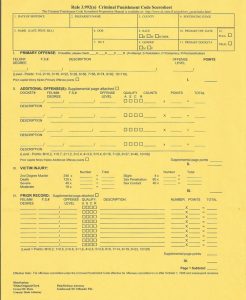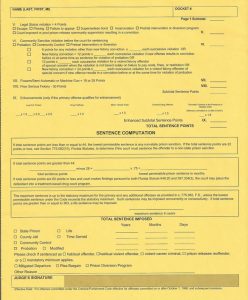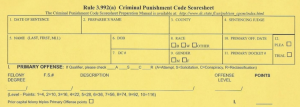How To Keep Your Attorney Accountable
I have filled out thousands of scoresheets during my practice. Many Defense attorneys have never filled out a scoresheet and prosecutors can make mistakes. Scoresheet mistakes can have a huge effect on your liberty and future – to the tune of years in prison. Call McCulloch Law, P.A. for a free consultation to discuss your scoresheet; BEFORE MISTAKES ARE MADE.
Below is a blank scoresheet. If you have been charged with a felony in the state of Florida, you will receive one of these from the state attorney’s office. A scoresheet is important because it can dictate your offer and sentence.
It’s important to realize that jail time (non-state time) and prison time (state time) are different. Even a misdemeanor with no points can result in jail time. Jail is for a sentence of 365 days or less. Prison time is for a sentence of more than 1 year (and applies to felony charges). More than 44 points scores you mandatory prison time (366 days minimum), unless a different deal can be reached.
Every felony in Florida is given a DEGREE and LEVEL by statute.
The DEGREE refers to the degree of the felony; a 3rd degree felony is punishable by a maximum of 5 years in prison, a 2nd degree felony is punishable by a maximum of 15 years in prison, and a 1st degree felony is punishable by a maximum of 30 years to life, depending on the nature of the crime. (As you will see, the prison time mandated by the scoresheet can override and increase the maximum years dictated by the DEGREE).
The LEVEL refers to the number, 1 – 10, given to each crime. Each LEVEL dictates the number of points associated with each type of crime.
The total POINTS are based mainly on the LEVEL of current charges, the LEVEL of prior convictions and classifications of crimes under the statutes. If points total more than 44, the number of months (in prison time) is calculated using the formula on the second page of the scoresheet.
Many other things can affect the total points of the scoresheet. Certain enumerated crimes carry mandatory minimum prison sentences that override the scoresheet. Violations of probation can significantly increase scoresheet points. Prior convictions can categorize people into groups such as Prison Release Re-Offender, Habitual Felony Offender, Habitual Violent Felony Offenders, 3 Strikes Offender and GORT Offender to name a few. The 10-20-Life statutes and other Chapter 775 statutes specify enhancements for gun and other heinous crimes.
Unless a different deal can be negotiated, a score of more than 44 points will mandate prison time and even 22 points or less can result in prison time. See Fla. Stat 775.082(10): “If a defendant is sentenced for an offense committed on or after July 1, 2009, which is a third degree felony but not a forcible felony as defined in Fla stat.776.08, and excluding any third degree felony violation under chapter 810, and if the total sentence points pursuant to Fla. Stat. 921.0024 are 22 points or fewer, the court must sentence the offender to a non-state prison sanction. However, if the court makes written findings that a non-state prison sanction could present a danger to the public, the court may sentence the offender to a state correctional facility pursuant to this section.”




January 11, 2019
Copyright 2018 McCulloch Law. All rights reserved. | Designed by: Digital Resource
